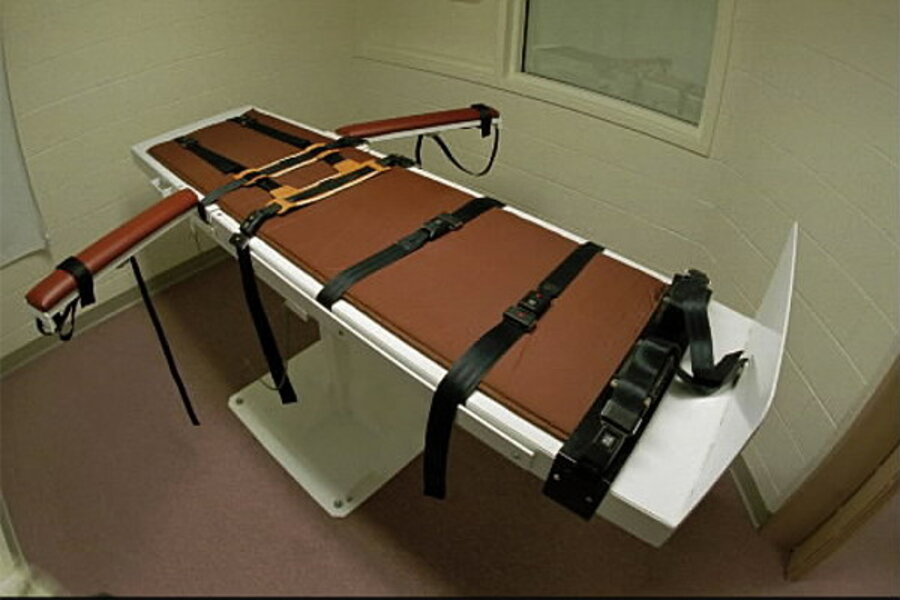Death penalty drug shortage: Oklahoma resets executions amid drug search
Loading...
| OKLAHOMA CITY
An Oklahoma court on Tuesday rescheduled a pair of executions set for this week and next, so state prison officials will have more time to find a supply of drugs for the lethal injections.
The decision came in a lawsuit in which two inmates had sought more information about the drugs that would be used to execute them later this month. The inmates had sought a stay of their executions, but the Oklahoma Court of Criminal Appeals said that request was moot because the state Department of Corrections doesn't have enough drugs on hand to carry out their death sentences.
"The attorney general's attestations give this court no confidence that the state will be able to procure the necessary drugs before the scheduled executions are carried out," the court wrote.
Oklahoma and other states that have the death penalty have been scrambling for substitute drugs or new sources for drugs for lethal injections after major drugmakers — many based in Europe with longtime opposition to the death penalty — stopped selling to prisons and corrections departments.
While the judges didn't rule on the merit of the inmates' stay request, they pushed their executions back a month — Clayton Lockett to April 22 and Charles Warner to April 29.
"We were hoping for a stay until the district court can rule, but this effectively gives us that," Seth Day, one of the lawyers for the inmates, said in a telephone interview. "The district court will render their ruling before those dates."
Oklahoma Attorney General Scott Pruitt said he is upset the executions have been delayed, but said Warner and Lockett will ultimately still be punished for their crimes.
"This delay is not about the facts of the case, nor does it seek to overturn the convictions of these two murderers. Instead, it's about outside forces employing threats, intimidation, and coercion to keep the state of Oklahoma from imposing the punishment handed down for these heinous crimes," Pruitt said. "It's not a matter of if these punishments will be carried out, but it is only a matter of when."
Lockett, who was to be executed Thursday, was found guilty in the 1999 shooting death of a 19-year-old Perry woman. Warner was set to be executed on March 27 for the 1997 rape and murder of his girlfriend's 11-month-old daughter.
In their lawsuit, Lockett and Warner said they feared the drugs to be used might be contaminated and cause them undue harm, in violation of a constitutional guarantee against cruel or unusual punishment. A hearing in Oklahoma County District Court is set for March 26 on whether it's proper for the state to keep execution procedures behind a "veil of secrecy."
"We are relieved that the OCCA's decision allows Mr. Warner and Mr. Lockett to proceed on their constitutional challenge to Oklahoma's execution-secrecy law and execution protocol," Madeline Cohen, a federal public defender who previously represented Charles Warner, said. "We hope that no execution will go forward until we are able to obtain full information about how Oklahoma intends to conduct those executions, including the source of its execution drugs."
In briefs filed with the Court of Criminal Appeals on Monday, the state attorney general's office said prison officials were having difficulty finding pentobarbital, a sedative, and vecuronium bromide, a muscle relaxant. The state also uses potassium chloride to stop an inmate's heart.
"The state declared it had pursued 'every feasible option to obtain the necessary execution drugs' but its 'Herculean' efforts so far had been unsuccessful," the court wrote.
State lawyers warned that, if it is required to find different drugs, it would have to write a new execution protocol that would likely face another court challenge.
Judge Gary L. Lumpkin dissented Tuesday's decision. He said the inmates had failed to meet their burden for a stay but said the court shouldn't have granted a delay because the state hadn't asked for one.
Copyright 2014 The Associated Press. All rights reserved. This material may not be published, broadcast, rewritten or redistributed.





